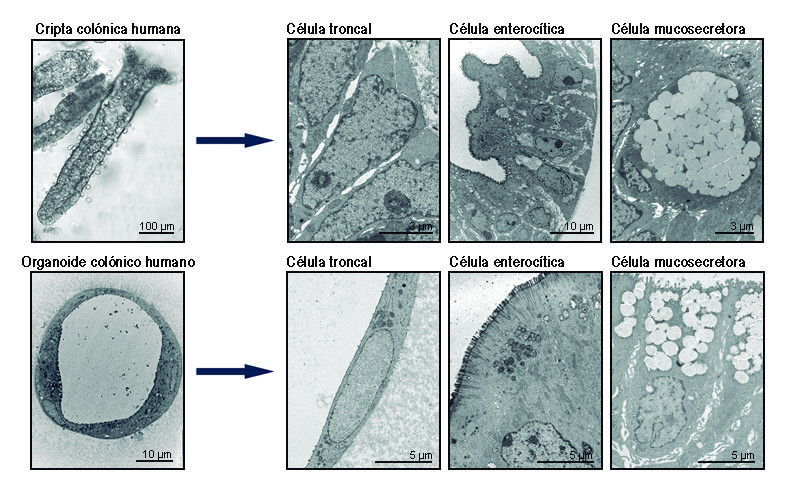- The team led by Prof. Alberto Muñoz presents a pioneering study exploring the impact of vitamin D on stem cells of the human colon epithelium
This innovative work, entitled Vitamin D opposes multilineage cell differentiation induced by Notch inhibition and BMP4 pathway activation in human colon organoids, has been published in the journal Cell Death and Disease. The publication describes the establishment, in human organoids, of a model for the differentiation of stem cells from colonic crypts into the most common cell types of the colon epithelium: enterocytes, responsible for water absorption, and mucus-secreting cells, responsible for producing the mucus that facilitates the passage of stool along the intestinal tract. This model provides an opportunity to further explore the biology and pathologies of this system.
The Colon Cancer Group: Organoids, Microenvironment and Vitamin D, led by Prof. Alberto Muñoz at the Instituto de Investigaciones Biomédicas Sols-Morreale (IIBM) CSIC-UAM,
employed a variety of techniques, including transcriptomics (RNA-seq), Western blot, immunofluorescence, and ultrastructural analyses by electron microscopy. Together, these approaches allowed for a detailed characterization of the process of cell differentiation induced by Bone Morphogenetic Protein (BMP)-4 and by inhibition of the Notch signaling pathway in the colonic epithelium, as well as the effect of calcitriol (the active metabolite of vitamin D) on this process.
The study describes that calcitriol plays a crucial role by promoting the maintenance of the undifferentiated phenotype of stem cells in the human colonic epithelium. This would prevent the loss of these cells, which are responsible for the essential weekly renewal of the intestinal epithelium during adult life. By contrast, in tumor colonic organoids, calcitriol exerts a pro-differentiating effect, a result that is consistent with the already described antitumor actions of vitamin D.

The figure shows electron microscopy images illustrating how the organoids faithfully reproduce the different cell types of the colonic crypt
In this study, the importance of maintaining adequate levels of vitamin D in the blood is once again highlighted, as a preventive measure against the deterioration of the colonic epithelium, commonly associated with inflammatory bowel disease (ulcerative colitis and Crohn’s disease) and with an increased risk of developing colon cancer,” states Dr. Pilar Bustamante-Madrid, first author of this article. “In addition, our work emphasizes that this model of cell differentiation in paired organoids, both normal and tumoral from the same patient, could be of great value for the identification of antitumor agents that would cause fewer side effects in patients affected by colon cancer,” adds Dr. Asunción Fernández-Barral.
This work has been made possible thanks to the collaboration of an interdisciplinary team composed of researchers from the IIBM (CSIC-UAM), the Centro de Investigación Biomédica en Red-Cáncer (CIBERONC) and the Instituto de Investigación Sanitaria Hospital Universitario La Paz, (IdiPAZ), together with oncologists, surgeons, and endoscopists from that Hospital, as well as researchers from the Centro Nacional de Investigaciones Oncológicas (CNIO) and the Universidad de Cantabria-IDIVAL
The article Vitamin D opposes multilineage cell differentiation induced by Notch inhibition and BMP4 pathway activation in human colon organoids, can be read HERE